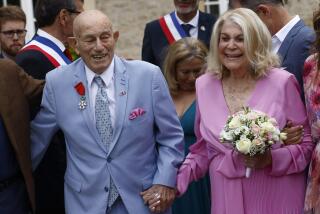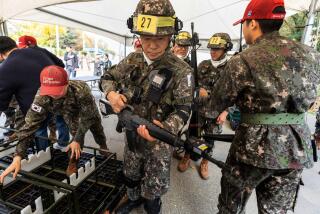Old Soldiers Never Die, They Retire
- Share via
PLANTATION, Fla. — He’s been back from Iraq for almost two months, but Army Sgt. 1st Class Clarence Kugler still wears his desert combat boots. In fact, he finds them so comfortable he has acquired six pairs.
During his nine months in Baghdad with the 478th Civil Affairs Battalion, the 59-year-old Kugler, who also served in Vietnam, was identified as the oldest enlisted soldier in Iraq -- a distinction he jokingly says no one may have wanted to challenge him for. When the noncom with the salt-and-pepper mustache, triathlete’s rangy physique and ready quip retires in February at 60, another living link to the old U.S. military will have faded away.
“I don’t see any people older than me in uniform now,” Kugler said during a break in his peacetime job as an investigator with the U.S. Department of Labor in the Fort Lauderdale area. In Iraq, he found only two soldiers who also had served in Vietnam.
Younger troops continually asked him about the patch from the now-inactive Americal Division that he wore on his right shoulder. In a Baghdad chow line, he recalled, a youthful captain came up to tell him that his father had also fought in Vietnam and pumped his hand in gratitude.
“I’m considering writing a book,” Kugler said with a broad smile. “The title will be ‘Geezer Soldier.’ ”
In 1969, while a graduate student in radio, television and motion pictures at the University of North Carolina, Kugler volunteered to join Army Officer Candidate School when it became clear he was going to be drafted. He was sent to infantry school at Ft. Benning, Ga. That year, the size of U.S. forces in Vietnam peaked at 543,000, and young infantry lieutenants were dying at such a brisk clip that becoming one wouldn’t have been Kugler’s first choice.
“Unless you were a great soldier with the desire to surround yourself with danger, this was not something you wanted to do coming out of graduate school,” he said.
According to Conrad C. Crane, director of the U.S. Army Military History Institute at Carlisle Barracks, Pa., what Kugler and the few elder servicemen who remain from that era have seen -- and done their part to produce -- is nothing less than a military and institutional revolution. “Vietnam was a cataclysmic event for the Army,” said Crane, who graduated from West Point in 1974 and served in the Army for 24 years. “It caused a lot of changes and created the superb force we know today.”
Today, the Army is markedly smaller and all volunteer. It is better trained and led, said Crane, who taught history at West Point for 12 years. That is no indictment of Vietnam-era soldiers, the vast majority of whom served “honorably and well,” the historian said. But as an institution, he added, the Army of that period was a “disaster.” It took a decade to fix it.
Because military careers typically last less than 30 years, only a few people currently on active duty -- including some generals and sergeant majors -- can recall what it was like to be in the rice paddies of Vietnam. Some current members of the National Guard and reserve may also have served in Southeast Asia. But Matthew Seelinger, a historian with the Army Historical Foundation in Arlington, Va., said he had noticed a substantial drop in the number of soldiers he met who sported Vietnam-era ribbons or unit patches.
In Baghdad, where Kugler’s assignment was assisting civilians with their problems, he was continually reminded of the changes in the Army, including the presence of female soldiers , two of whom guarded his back on convoys through the Iraqi capital.
“In reality,” he said, “they were probably better shots than me.” It had been 33 years, he calculated, since he had seen combat.
Today’s soldiers, on the whole, are more educated, more professional and more committed, Kugler said. “In the Vietnam era, you had the lifers and the normal people. Today, just about everybody has made a commitment to the Army. You are dealing with men and women who want to be there. This is a much more sophisticated group of people, people who at least have a high school education. During Vietnam, if you didn’t have a high school education, you went into the Army.”
After 3 1/2 years on active duty, Kugler returned to civilian life before going into the reserves fulltime as the enlisted man in charge of promoting equal opportunity in a Florida unit. Last year, he said, he returned to active duty to train for a NATO athletic competition. (Kugler met his wife of 19 years, Ali, a fifth-grade teacher, while running. They entered a triathlon together and won. They have two sons, ages 18 and 16.)
The Army “is not work, it’s really a lifestyle, an adventure,” said the Australian-born Kugler, who came to the United States as a child. His family owned a restaurant in downtown Philadelphia. Prior to being sent to Iraq, he had been on 13 civil-affairs missions overseas. He has been a veterinarian’s assistant in the jungles of Ecuador and a general’s driver in Panama, as well as working with a road-building crew in Honduras.
“Iraq is like opening up your oven on Thanksgiving Day and sticking your head in beside the turkey,” Kugler said. He found the sense of danger there unrelenting. In Vietnam, “once you went into Chu Lai or the other bases, they were so large, you had a sense of security,” he remembered. “One element you didn’t have to worry about was mortaring and rocketing.” In Iraq, by contrast, “there is really no safe area.”
In Baghdad, Kugler adopted a mantra to cope with moments of great stress. “I thought of the guy during the Battle of the Bulge who told the Germans, ‘Nuts,’ ” he said. “So when I’d take seven [ammunition] magazines, an M-16, and get into an open vehicle to drive into a city of 5.5 million people, knowing that somebody was going to get blown up that day, and I heard a mortar come in, I’d say, ‘Nuts.’ ” His “personal code of machismo,” he said, meant not showing fear to the younger soldiers.
At the same time, Kugler derived enormous fulfillment, even pleasure, from his Baghdad duty. “The air smells different, everything to your senses is new and you kind of get an adrenaline rush from being in that situation.”
Back home since Oct. 7, and with his retirement party already scheduled -- the first in the history of the 478th Civil Affairs Battalion -- he admits feeling a little down. Maybe, Kugler said, he’d go out and drive in traffic on the interstate to give himself an adrenaline kick.
More to Read
Sign up for Essential California
The most important California stories and recommendations in your inbox every morning.
You may occasionally receive promotional content from the Los Angeles Times.













